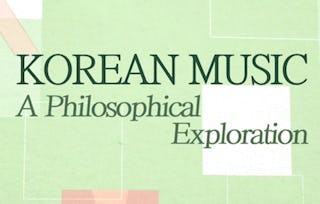This course will be an overview of a development of the theological methods in relation to Korea’s cultural context. Completing the course, the learners can understand cultural influences on the dynamic development of Korean churches and indigenous theology; they can also gain an insight into their own image of God and theological imagination in their own cultural context.

Re-imaging God in Korean Context

110 reviews
Skills you'll gain
Details to know

Add to your LinkedIn profile
5 assignments
See how employees at top companies are mastering in-demand skills

There are 5 modules in this course
The chief goal of the course will be to understand a rapid growth and dynamic development of the Korean Protestant churches and indigenous theology by exploring various images of God in Korea. The first module will focus on an important methodological shift in contemporary theology from conceptual intellect to the human imagination.
What's included
6 videos1 reading1 assignment
The second module will discuss one’s formation of God-image as a Father with a comprehensive understanding of Freud’s psychoanalysis since many psychoanalytic theorists have argued that one’s early experience of parental relationship has an unavoidable, unconscious impact upon the formation of one’s own God-images.
What's included
5 videos1 reading1 assignment
The module 3 will examine the image of a heavenly God in the cultural context of Korea with the emphasis on Korean Confucian understanding of the "Chon" (heaven). Noting the collective (cultural) representations of the "Chon" (heaven), the interplay among transcendental and immanent images of God in the formation of the Korean Protestant churches will be discussed.
What's included
5 videos1 reading1 assignment
The module 4 will focus on Kwok Pui-lan’s proposal of biblical interpretation as “Dialogical Imagination” in which the Korean Minjung theology strengthens the power of theological imagination. This module will demonstrate how the immanent image of God as rice to the Korean Minjung theology became the central theme of the Christian social movement in Korea.
What's included
5 videos1 reading1 assignment
The last module will first examine how shamanistic beliefs affected the healing ministry of Christianity through the Pentecostal movement in Korea. The module will show that both the Korean Pentecostal group and the liberationist group can commonly interpret God as Spirit to be a fundamental base for their theological imagination.
What's included
5 videos1 reading1 assignment
Instructor

Offered by
Explore more from Philosophy
 Status: Free Trial
Status: Free TrialSungkyunkwan University
 Status: Free Trial
Status: Free TrialSungkyunkwan University
 Status: Free Trial
Status: Free TrialSungkyunkwan University
 Status: Preview
Status: PreviewSungkyunkwan University
Why people choose Coursera for their career

Felipe M.

Jennifer J.

Larry W.

Chaitanya A.
Learner reviews
- 5 stars
82.88%
- 4 stars
13.51%
- 3 stars
2.70%
- 2 stars
0%
- 1 star
0.90%
Showing 3 of 110
Reviewed on Nov 28, 2020
Studying about Korean Religious aspect gave me a clear awareness of their beliefs. Thankyou
Reviewed on Aug 31, 2022
This course is actually profound and not reductionist at all! Impressed by the professor's compilling skill too.
Reviewed on Feb 10, 2020
This course enable me to know more deeply about God in Korean Context and learn more about Minjung Theology.

Open new doors with Coursera Plus
Unlimited access to 10,000+ world-class courses, hands-on projects, and job-ready certificate programs - all included in your subscription
Advance your career with an online degree
Earn a degree from world-class universities - 100% online
Join over 3,400 global companies that choose Coursera for Business
Upskill your employees to excel in the digital economy
Frequently asked questions
To access the course materials, assignments and to earn a Certificate, you will need to purchase the Certificate experience when you enroll in a course. You can try a Free Trial instead, or apply for Financial Aid. The course may offer 'Full Course, No Certificate' instead. This option lets you see all course materials, submit required assessments, and get a final grade. This also means that you will not be able to purchase a Certificate experience.
When you purchase a Certificate you get access to all course materials, including graded assignments. Upon completing the course, your electronic Certificate will be added to your Accomplishments page - from there, you can print your Certificate or add it to your LinkedIn profile.
Yes. In select learning programs, you can apply for financial aid or a scholarship if you can’t afford the enrollment fee. If fin aid or scholarship is available for your learning program selection, you’ll find a link to apply on the description page.
More questions
Financial aid available,

